Whole of Society

What is whole-of-society? Read the OECD Recommendation of the Council on Public Integrity and the OECD Public Integrity Handbook's chapter on whole-of-society to learn more.
Tools
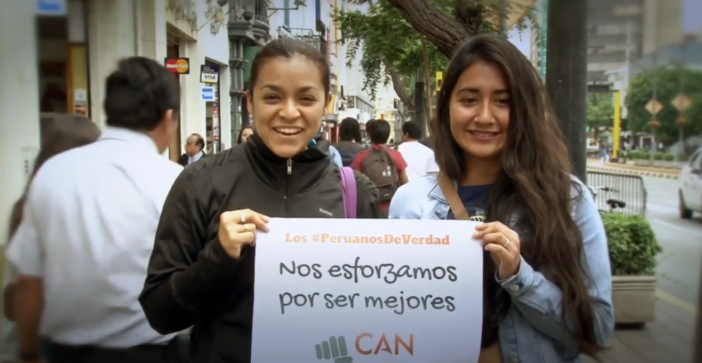
#Peruanosdeverdad online campaign
This online campaign, which includes a YouTube video, aims to counteract the norms that undermine the integrity of Peruvian society by providing new, positive norms to promote change.

Central Anti-Corruption Bureau e-learning platform
This free online training course provides 3 modules (corruption in public administration, corruption in business, and countering corruption) to public officials, entrepreneurs and students.

Culture of integrity interactive routes
This website presents interactive ‘routes’ offering activities, tools and workshops for school students, university students, and public officials, to inform, encourage reflection and propose ways of promoting integrity, enabling transparency and helping to create a culture of integrity within society.

ETICO online resource platform on ethics and corruption in education
ETICO is a dynamic clearinghouse for all information and activities related to transparency and accountability issues in education. Developed by IIEP-UNESCO, it will provide you with more than 800 references on publications, projects, policies, and norms; thematic pages on key issues in the area of ethics and corruption in education; a glossary with definitions of the most important terms used in the fight against corruption in education; an agenda displaying recent and forthcoming events, conferences, and workshops; a blog that offers the global anti-corruption community a space to publish new ideas and discuss them; and a selection of over 1,500 newspaper articles on corruption in education issues from all over the world.

Guidebook for designing and implementing open school data policies
“Open School Data: What planners need to know” published by IIEP-UNESCO addresses five key questions: What are the most critical data to publish? What format is most likely to encourage communities to make use of them? How can we foster the active engagement of citizens? What actions are required to close the accountability loop? What are the major risks attached to the opening up of information? It builds on the findings of six case studies on open data projects conducted across the Asia Pacific region, and two regional state-of-the-art reports on open school data (one in Africa and the other on Latin America) that are all accessible online on the ETICO website.
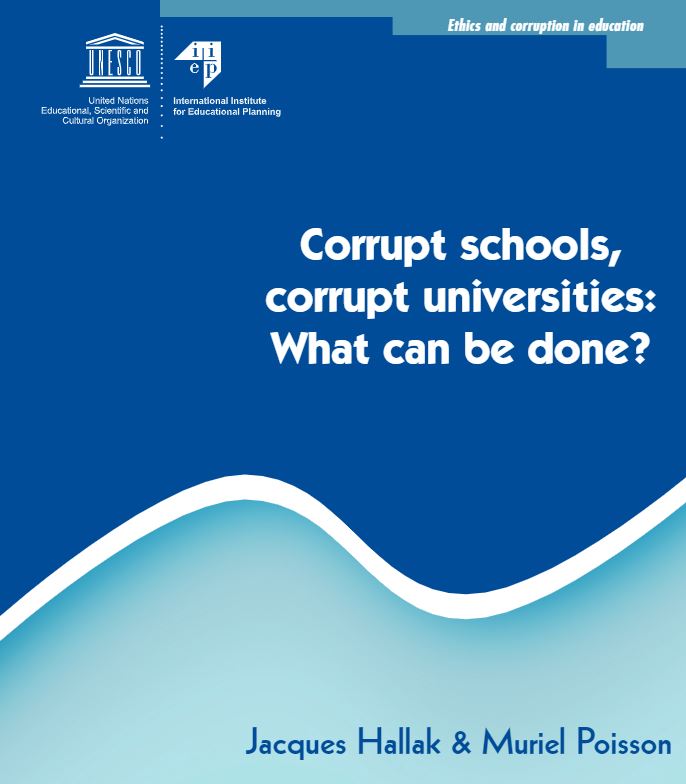
Guidebook on how to address corruption risks in the education sector
“Corrupt schools, corrupt universities: What can be done?” presents conclusions drawn from UNESCO-IIEP’s research into ethics and corruption in education. It helps to build awareness among decision-makers and education managers of the importance of combating corruption, provides them with tools to detect and assess corruption problems, and guides them in formulating strategies to curb malpractices.
Languages: Also available in Azeri and Arabic.
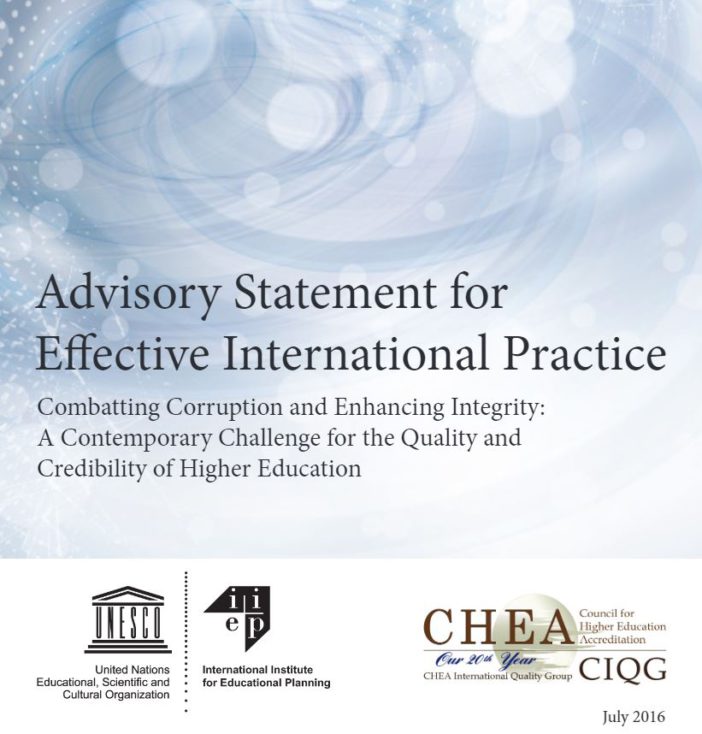
Guidelines for combatting corruption in higher education
This is an advisory statement for effective international practice in combatting corruption and enhancing integrity. It was developed by IIEP-UNESCO together with the Council for Higher Education Accreditation (CHEA) and addresses contemporary challenges for the quality and credibility of higher education. It also provides some guidelines to the various stakeholders for effective international practice in combatting corruption in higher education – with a special focus on the role that quality assurance should play. Finally, it includes a matrix that lists some of the major issues for action and indicates which stakeholders should address them.

Guidelines on the design and development of teacher codes of conduct
These guidelines have been prepared by IIEP-UNESCO to help countries successfully design a teacher code of conduct (or review an existing one) and put in place the appropriate mechanisms to ensure its proper dissemination, application, and monitoring at all levels of the system. They are aimed both at national and local stakeholders. They follow the major steps involved in the development of a code. For more detailed information on each aspect of the guidelines, the reader is directed to the Resources and Tools that are included in annexes.
Languages: Also available in Arabic, Croatian and Lao.

Interactive world map on comparative country statistics on corruption in education
This interactive map put together by IIEP-UNESCO will allow you to access information about the existence of global corruption surveys including specific questions related to education. By clicking on the map, you can consult data available country by country.
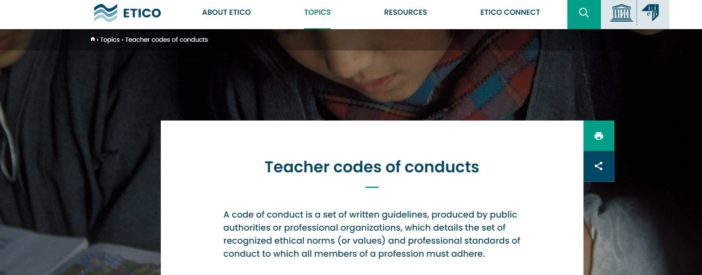
Interactive world map on teacher codes of conduct
This interactive map put together by IIEP-UNESCO will allow you to consult examples of teacher codes of conduct from around 76 different countries worldwide.
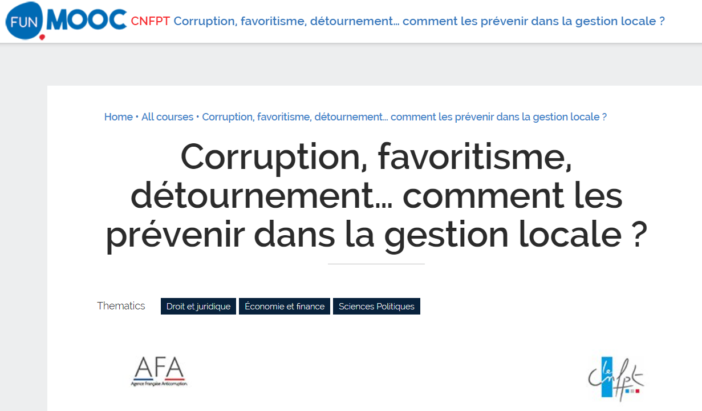
Massive Open Online Course (MOOC) « Corruption, favoritisme, détournement… Comment les prévenir dans la gestion locale ? »
This open online course consists of 4 sessions, and deals with subjects such as corruption, favouritism, misappropriation of public funds, and conflict of interest.

National Diagnostic Survey of Anti-Corruption Systems in Businesses
In February 2020, the French Anti-Corruption Agency (AFA) launched, in collaboration with French trade federations, a national diagnostic survey of nearly 2,000 companies of all business sectors in order to assess the maturity of their corruption prevention and detection systems. The diagnostic survey’s findings, presented in this document, cover a vast array of businesses ranging from SMEs to large corporations, whether or not they fall within the scope of the compliance obligations set out in Article 17 of the 2016 French Anti-Corruption Law, known as Sapin II.

Online course “Contralores Ciudadanos” (Citizen Comptroller)
This online course is offered as part of the Chilean General Comptroller of the Republic Studies centre (“Centro de Estudios de la Administración del Estado”), and teaches the public about public administration, ethics, probity and administrative transparency, and whistleblowing.

Online learning materials for students
This site brings together different learning materials – including online games, cartoons, exercises and competitions – targeted at children and young adults to teach them about subjects including integrity and ethics.

Online Trivia game Ciudadan@s (“Citizens”) for students
This online game develops the knowledge of 10-16 years old students about topics such as democracy, governance, human rights, participation, public concerns and transparency in a fun and interactive way.

Practical Guide on Anti-Corruption Due Diligence for Mergers and Acquisitions
Mergers and acquisitions are complex transactions that involve specific integrity risks, which can have significant financial, legal, and operational impacts if they were to materialize. It is therefore advisable that concerned companies conduct adequate checks before concluding these transactions. With a view to assisting companies in this process, the French Anti-Corruption Agency (AFA) published a guide on anti-corruption due diligence for mergers and acquisitions.

Practical Guide on Gifts and Hospitality Policy in Corporations and Non-Profits
By making a gift of a good or service, with no expectation of anything in return, an organization may show its attachment to certain values and traditions. Gifts and hospitality may also be part of its promotional strategy. Such gifts and hospitality are part of the normal way of doing business. This generosity, in itself, is neither illegal nor immoral, but, under certain circumstances, may give rise to suspicions about hidden advantages received in return that could expose the organization to integrity risks. Indeed, when given or received with a view to creating an obligation and leading the recipient to betray the interests under their responsibility, such gifts may result in bribery or influence peddling. A corporate policy setting the official rules for offering and receiving gifts and hospitality (“gifts and hospitality policy”) constitutes a key tool for managing such risks. In this context, the French Anti-Corruption Agency (AFA) published a guide that aims to help companies, whether public or private, and non-profits to design and effectively implement a gifts and hospitality policy.
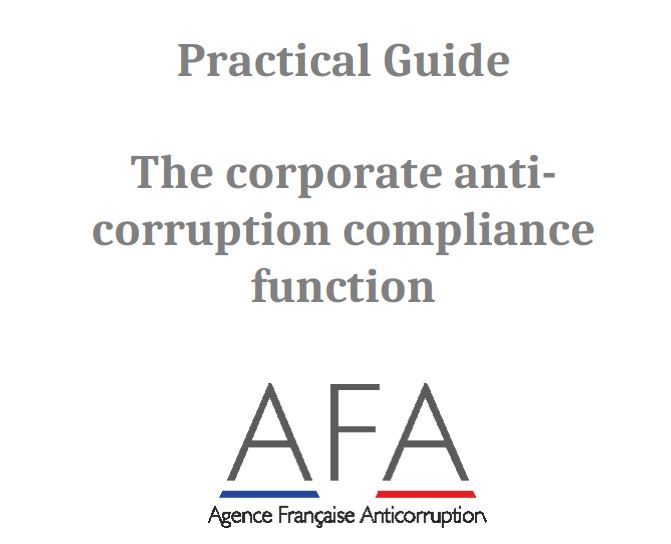
Practical Guide on the Corporate Anti-Corruption Compliance Function
The French Anti-Corruption Agency (AFA) published this guide in order to help senior managers to structure an effective, integrated anti-corruption compliance function in their companies. Specifically, the guide highlights that the appointment of an anti-corruption compliance officer, the officer’s hierarchical position, and the resources allocated to this function can serve as evidence of senior management’s commitment to the prevention and detection of corruption.
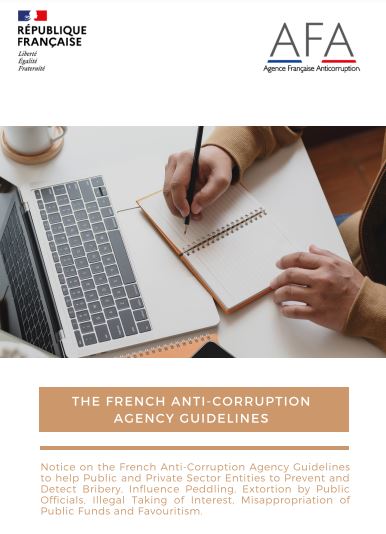
The French Anticorruption Agency’s Guidelines to Help Public and Private Sector Entities to Prevent and Detect Corruption
The French Anticorruption Agency (AFA)’s guidelines’ aim to help organizations, whether public or private, big or small, French or foreign, to prevent and detect corruption and related offences against integrity. Developed through a collaborative process, these recommendations stem from the experience acquired during the past three years, as well as the feedback from multiple stakeholders, gathered via a public consultation. In particular, they include inputs from government entities, trade associations, consulting firms, and NGOs. In accordance with international best standards, the AFA’s guidelines provide comprehensive guidance on how to design and implement an effective anti-corruption program.
Their structure is composed of three key parts, tailored to the specific needs of various kinds of organizations:
- The first part contains general guidance applicable to all entities. This guidance revolves around three pillars: the commitment of senior management, the accurate knowledge of the corruption risks to which the entity is exposed (corruption risk mapping), and the management of these risks through prevention, detection, and remediation measures.
- The second part concerns large companies subject to the compliance requirements of the 2016 French Anti-Corruption Law, known as Sapin II.
- The third section is dedicated to organizations of the public sector.
Wide-ranging, yet precise, the AFA’s guidelines are a valuable resource to anti-corruption practitioners both in France and abroad.

The NCPA Practical Guidelines on Facilitation Payments
Facilitation payments are payments made to secure or expedite the performance of a routine governmental action to which the payer is in effect entitled. Qualified as a form of bribe in many jurisdictions, such payments are widely considered as detrimental to society as they undermine the rule of law and fair competition. The Network of Corruption Prevention Authorities (NCPA) released practical guidelines to help businesses address this key issue and thereby uphold public integrity in the countries where they operate.
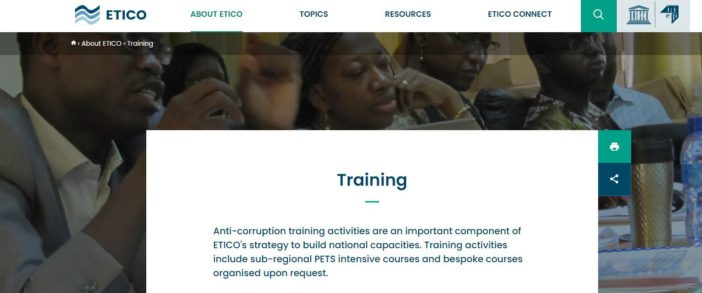
Training course on transparency, accountability and anti-corruption measures in education
This is a training course designed and taught by IIEP-UNESCO on diagnostic tools to assess corruption risks in education and successful strategies to improve transparency and accountability in national education systems. It combines individual readings, interactive online discussions, and collaborative group work.
Submit a digital tool here
Something wrong? Report it here
The OECD Public Integrity Toolkit is a non-exhaustive list of integrity-related practices and tools, designed purely for informative purposes. Using the platform does not involve the provision of personal data, and your searches are kept anonymous. The inclusion of a tool on this list under no circumstances represents an endorsement by the OECD, and none of the included tools are affiliated with the OECD. The OECD cannot be held responsible for changes, errors or omissions on the listed websites.